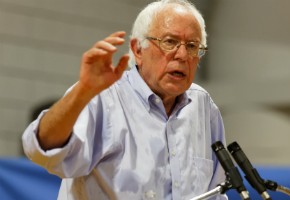Bible as common ground

When Democratic presidential candidate Bernie Sanders went to Liberty University in Virginia last month, he wasn’t looking for votes. The man who embraces the label “democratic socialist” knew he wasn’t likely to persuade many conservative Christians at Liberty to support his campaign. He was interested in laying out some common ground. In talking to students at one of the nation’s most conservative Christian colleges, Sanders, a secular Jew, began by citing the Bible. He quoted from the books of Amos and Matthew, and, as he often does, from Pope Francis. At one point he urged the crowd to put his words in the “context of the Bible, not me.”
He acknowledged that the audience probably didn’t share his support for abortion rights and gay marriage, and he didn’t press those issues. Instead he focused on economic injustice as the subject for fruitful conversation. Citing biblical principles of justice, he spoke about income inequality and youth unemployment. Citing family values, he spoke about paid medical leave. Sanders’s applause line was: “Money and wealth should serve the people. The people should not have to serve money and wealth.” The audience at Liberty indeed applauded, if mostly out of politeness. Doubtless many remained convinced that charities, not governments, are the vehicles for addressing economic inequalities.
At a moment when the political spotlight shines on those who say the most outrageous things, it is worth noting Sanders’s attempt to broaden the political conversation. Conventional wisdom says that the primary candidates need to rush to the margins and shore up the base. Sanders is unusual in his apparent willingness to say what he thinks to anybody who will listen.
Judging from the polls, Sanders and Donald Trump have both benefited from a popular enthusiasm for candidates who aren’t cut from the usual cloth and who speak the truth as they see it. Both are fearless—but in different ways. Trump is fearless because of his boundless confidence in himself—in his personality, his negotiating skills, his wealth. His most often used word on the stump is “I.”
Sanders is fearless because he has so little interest in hiding, diluting, or recasting his views. He is an unabashed believer in imposing higher taxes on corporations and the wealthy in order to fund education and health care for everyone. He is one of the few politicians to continue to talk about a single-payer, government-run health insurance. One senses that Sanders supports these policies not because they are poll tested but because he is convinced they make sense, and because he actually thinks the people who disagree will come around if he puts his ideas in the right context. He may be a long shot for president, but he offers a refreshing model for political dialogue.




